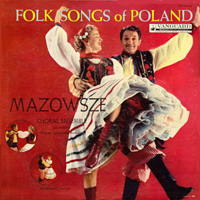
|
The Society of Folk Dance Historians (SFDH)
Folk Songs of Poland
[
Home |
About |
Encyclopedia | CLICK AN IMAGE TO ENLARGE |

|
Information: A recording.
Folk Songs of Poland, by the Polish Cultural Institute. London, England: Polish Cultural Institute, 1954. "These songs were first arranged by T. Sygietyński (see photo above) for the Mazowsze Folk Song and Dance Ensemble. "PCI 54"
INTRODUCTION
The years since Poland was liberated from the Nazis have seen very great developments in the economic and cultural life of the Polish people; an important role in this great cultural upsurge is being played by folk-music.
In many countries, the development of large industrial cities has brought about the decay of folk-music. This has not been the case in Poland, in spite of the tremendous industrial progress made in the last years, thanks to the active support which the government is giving to the preservation and development of folk-music both in the large cities and in the countryside. The collecting of folk-music is in operation on a large scale, but greater importance is attached to its performance by the people themselves. Folk-music revivals often fail because they are led by people interested only in preserving folk-music in its 'original' or 'pure' form. No-one knows the 'original' or 'pure' form of any folk-song – it is lost in antiquity – and even if anyone did, that knowledge would not help to bring it to life. In Poland today it is understood that folk-music must be interpreted so that it reflects present-day life, if it is to have real meaning to the people who perform and listen to it. Nor is it sufficient to encourage people to sing and dance; they will derive more and lasting pleasure if they are organised into permanent ensembles that set themselves as high a standard as possible.
There are many such ensembles in Poland, made up of ordinary working people, which achieve a remarkably high standard of performance both technically and artistically. One of the most famous is the Mazowsze Ensemble, initiated in 1948 by Tadeusz Sygietyński, a well-known composer and conductor. He and his colleagues visited many small and remote villages in Mazaovia (which had been one of the most backward regions of Poland), giving auditions to as many as five thousand young singers and dancers. He chose a hundred for his ensemble who were then given a thorough general musical education, including ballet, instrumental playing, and even the history of music. As gramophone records that I have heard reveal, the high technical level of this ensemble in no way detracts from the directness, simplicity and human content of the songs.
The present collection of songs are some of the most popular in the repertoire of the Mazowsze Ensemble. Although they are all characteristically Polish in their melodic and rhythmical idiom, the content and imagery of the words are of universal appeal. The unity of words and melody in all folk-song is always in danger of being lost in translation, but the translators of these songs have succeeded, in my opinion, in expressing the meaning of the original in real English idiom, while preserving faithfully the rhythm of the Polish.
British singers and listeners should find great pleasure in these songs, particularly if they are sung simply and directly, so that their human feeling finds full expression.
–Bernard Stevens
CONTENTS
- Pine Cones (Szyszki)
- Softly -O-Ha-Ha-Softly! (Trudno)
- The Suitors (Kawiliry)
- Is That So? (To I Hola)
- Little Cuckoo (Kukułeczka)
- The Valley (Dolina)
- Why Did You Never Come? (A Czemužeš Nie Przyszedł)
- Where The Alders Grow (W Olszynie)
- In The Wood (Pod Borem)
- Mary, Time You Were Wedded! (Walc Weselny)
DOCUMENTS
This page © 2018 by Ron Houston.
Please do not copy any part of this page without including this copyright notice.
Please do not copy small portions out of context.
Please do not copy large portions without permission from Ron Houston.
